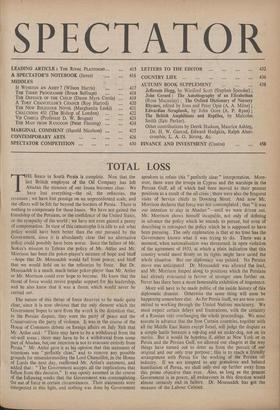TOTAL LOSS
The nature of this threat of force deserves to be made quite clear, since it is now obvious that the only element which the Government hopes to save from the wreck is the distortion that, in the Persian dispute, they were the party of peace and the Conservatives the party of violence. It was in the course of the House of Commons debate on foreign affairs on July 30th that Mr. Attlee said: "There may have to be a withdrawal from the oil-well areas ; there may have to be a withdrawal from some part of Abadan, but our intention is not to evacuate entirely from Persia." Mr. Attlee gave it as his opinion that this statement of intentions was "perfectly clear," and to remove any possible grounds for misunderstanding the Lord Chancellor, in the House of Lords the next day, reaffirmed Mr. Attlee's statement, and added that: "The Government accepts all the implications that follow from this decision." It was openly assumed in the course of the following weeks that the Government was contemplating the use of force in certain circumstances. Their statements were interpreted in this light, and nothing was done by Government speakers to refute this "perfectly clear" interpretation. More- over, there were the troops in Cyprus and the warships in the Persian Gulf, all of which had been .moved to their present positions as a result of the oil crisis ; there were also the frequent visits of Service chiefs to Downing Street. And now Mr. Morrison declares that force was not contemplated ; that "it was our intention to stay in Abadan "—until we were driven out. Mr. Morrison shows himself incapable, not only of defining in advance the policy which he intends to pursue, but even of describing in retrospect the policy which he is supposed to have been pursuing. The only explanation is that at no time has the Government known what it was trying to do. Thera was a moment, when nationalisation was threatened, in open violation of the agreement of 1933, at which a plain indication that this country would stand firmly on its rights might have saved the whole situation. But our diplomacy was palsied. No Persian move was anticipated. Dr. Moussadek was allowed the lead, and Mr. Morrison limped along to positions which the Persians had already evacuated in favour of stronger ones further on. Never has there been a more lamentable exhibition of impotence.
More will have to be made public of the inside history of this diplomatic disaster. Otherwise the same thing will soon be happening somewhere else. As for Persia itself, we are now com- mitted to working through the United Nations machinery. We must expect certain delays and frustrations, with the certainty of a Russian veto overhanging the whole proceedings. We must assume in advance that the Iron Curtain countries, together with all the Middle East States except Israel, will judge the dispute as a simple battle between a top-dog and an under-dog, not on its merits. But it would be hopeless if, either at New York or in Persia and the Persian Gulf, we allowed our chagrin at the way things have turned out to deter us from the pursuit of our original and our only true purpose ; this is to reach a friendly arrangement with Persia for the working of the Persian oil industry. If we are tempted to any gratuitous and belated humiliation of Persia, we shall only end up further away from this prime objective than ever. Also, as long as the present Government is in power, all endeavours in this direction would almost certainly end in failure. Dr. Moussadek has got the measure of the Labour Cabinet.





















































 Previous page
Previous page